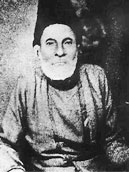Mirza Ghalib
Mirza Ghalib (* probably December 27, 1797 in Agra ; † February 15, 1869 in Delhi ; DMG transcription Mīrzā Asadallāh H̱ān Ġālib), also known as Ghalib or Mirza Asadullah Beg Khan , was an Indian poet of Indian-Turkish descent. He is one of the best known and to this day most popular poets in the Urdu language. Some of his poems are part of general education in India and Pakistan . According to tradition, he took the poet name Ghalib ("Outstanding"); however, his maiden name is Mirza Asadullah Beg Khan.
Life
He was born in Agra, where he was born to Indo-Turkish nobles. At thirteen he was married into a wealthy family and he left Agra to live in Delhi for the rest of his life. All of his children died early. When he started writing poetry is unknown.
In 1850 Ghalib received a title from the last Mughal, Bahadur Shah II, and came to his court. In 1854 he was appointed poetry teacher to the emperor and the crown prince. However, Emperor Bahadur Shah was a pensioner by the grace of England, and his rule extended essentially only to the Red Fort in Delhi. Ghalib's poet feud with the court poet Zauq seems to stem more from his profession than from personal enmity.
With the uprising of 1857 and the subsequent deposition of Emperor Bahadur Shah, Ghalib lost these posts. He had inherited a pension from his uncle, the extension of which he had to litigate. To do this, he traveled to Calcutta, but only years later was the pension awarded to him. His insistence on an aristocratic lifestyle including drinking and gambling meant that Ghalib was often in need of money. Finally the Nawab of Rampur supported him. Ghalib died in Delhi in 1869.
plant
Although Ghalib preferred his Persian poems, today he is most famous for his narrow work of Urdu poems. These are only seemingly simple and often hide a network of allusions that only gradually come to light. When he writes ironically:
- These mystical problems, your explanations, Ghalib!
- We'd even think you're a saint if you weren't a drunkard.
one has to know that “drinking” in Urdu religious poetry is an image of ecstasy by God's grace. But Ghalib literally drank.
Ghalib cultivated the attitude of a philosophical poet who had little love for institutional religion and who could count on the sympathy of the nobility:
- The aim of my worship is beyond perception;
- For people who see, the Kaaba is a compass and nothing else.
In this sense, "love" is metaphysical and "lovesickness" is the basis of existence:
- قید حیات و بند غم ، اصل میں دونوں ایک ہیں
- موت سے پہلے آدمی غم سے نجات پائے کیوں؟
- Life's prison and sorrow's bondage are basically both one.
- How could a person find relief from grief before he dies?
Apart from his poetry, his letters are a prime example of good Urdu prose, for which he alone deserves a place among the writers of South Asia.
Today's meaning
Ghalib's poems continue to be set to music and sung in India and Pakistan and thus reach a large audience.
His life was filmed in India in 1954 and in Pakistan in 1961, including the setting of many of his poems. In 1988, the television series Mirza Ghalib was broadcast in India , which became a huge success.
In addition, several plays deal with the poet's life.
swell
- Mirza Asadullah Ghalib. Wave of the Rose - Wave of the Wine. From the Persian and from the Urdu divan. Translation and selection: Annemarie Schimmel . Zurich: Arche 1971.
- Ralph Russell : The Oxford Ghalib. Life and Letters . Delhi: Oxford University Press 2003
- William Dalrymple : The Last Mughal . The Fall of a Dynasty, Delhi, 1857 . London: Bloomsbury 2006.
Web links
| personal data | |
|---|---|
| SURNAME | Ghalib, Mirza |
| ALTERNATIVE NAMES | Ghalib, Mirza Asadullah Beg Khan |
| BRIEF DESCRIPTION | Indian poet of Turkish descent |
| DATE OF BIRTH | uncertain: December 27, 1797 |
| PLACE OF BIRTH | Agra |
| DATE OF DEATH | February 15, 1869 |
| Place of death | Delhi |

